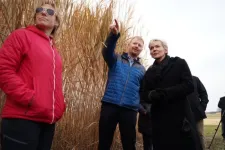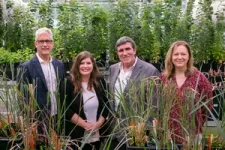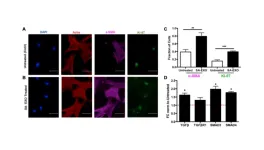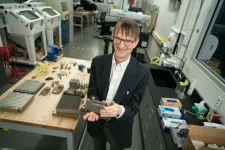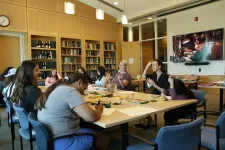(Press-News.org) The U.S. Department of Energy (DOE) has committed another round of funding to the University of Illinois Urbana-Champaign to lead the second phase of its Bioenergy Research Center — one of four large-scale DOE-funded research centers focused on innovation in biofuels, bioproducts, and a clean energy future for the country.
Earlier today the DOE announced a five-year extension of funding for the Center for Advanced Bioenergy and Bioproducts Innovation (CABBI), to a total of $237.9 million for the period from 2017 to 2027. CABBI is a collaboration between the university’s Institute for Sustainability, Energy, and Environment (iSEE), the Carl R. Woese Institute for Genomic Biology (IGB), 11 academic departments across the Illinois campus, and 20 partner institutions across the nation.
“To meet our future energy needs, we will need versatile renewables like bioenergy as a low-carbon fuel for some parts of our transportation sector,” U.S. Secretary of Energy Jennifer M. Granholm said in the DOE news release. “Continuing to fund the important scientific work conducted at our Bioenergy Research Centers is critical to ensuring these sustainable resources can be an efficient and affordable part of our clean energy future.”
Andrew Leakey, Professor and Head of the Department of Plant Biology at Illinois, will continue as Director of CABBI, a position he has held since 2020.
“Energy independence has become an increasingly important security issue for the United States, and CABBI will continue to provide breakthroughs toward a new generation of sustainable, cost-effective biofuels and bioproducts that will replace fossil fuel-based products,” Leakey said. “This grant represents a massive investment in CABBI and its diverse team of scientists. We are committed to help push the U.S. toward a new bio-based economy.”
During Phase II, CABBI researchers will continue to develop fuels and products by integrating three highly interconnected DOE priority areas:
Feedstock Production — Led by Emily Heaton, a Professor of Regenerative Agriculture in Crop Sciences at Illinois, scientists use the “plants as factories” paradigm, in which biofuels, bioproducts, and foundation molecules for conversion are grown directly in crops that are resilient and productive.
Conversion — Led by Huimin Zhao, the Steven L. Miller Chair in Chemical Engineering at Illinois, experts continue to develop unique tools, yeasts, enzymes, and processing methods to efficiently produce diverse, high-value molecules such as biodiesel, organic acids, jet fuels, lubricants, and alcohols.
Sustainability — Led by Wendy Yang, Associate Professor of Plant Biology and Geology at Illinois, researchers provide a holistic and systems-based approach to assess the economic and ecological sustainability of CABBI feedstocks, biofuels, and bioproducts from the Feedstock Production and Conversion Themes, at scales that range from the field to the biorefinery to the bioeconomy.
“Our economy and society will be strengthened by enhancing the productivity, resilience and sustainability of our agricultural system,” Leakey said, “and CABBI will help lead the way toward the cutting-edge scientific discoveries and technologies needed to sustainably and profitably produce fuels and chemicals using plants and microbes.”
Madhu Khanna, Alvin H. Baum Family Fund Chair and Director of iSEE and a CABBI Sustainability Theme researcher, said iSEE is excited to support CABBI research in partnership with IGB and with the College of Agricultural, Consumer and Environmental Sciences (ACES) to enable cutting-edge research at the 320-acre Illinois Energy Farm — “a unique living laboratory that enables researchers to grow trials of promising biofuel feedstocks at the field scale” — and other partner sites.
“One of the world’s major challenges is to provide sustainable sources of energy that meet societal needs as the population continues to grow,” Khanna said, “and Illinois is uniquely qualified to help lead that challenge” with the world-class facilities at IBRL and at IGB — the latter of which oversees and integrates CABBI’s core science team under one roof.
Said IGB Director Gene E. Robinson: “The IGB has over 15 years of experience in successfully addressing grand challenges by transdisciplinary integration of the life sciences, physical sciences, social sciences, and engineering, and we are proud to host the CABBI team. Our partnership with iSEE has been a successful one for five years, and we look forward to five more years of breakthrough discoveries.”
Susan Martinis, the Vice Chancellor for Research and Innovation at Illinois and Chair of CABBI’s Governance Board, noted the university’s strong DOE research portfolio, which is regularly among the top five in the nation. The Center is one of four DOE Bioenergy Research Centers (BRCs), joining the Great Lakes Bioenergy Research Center (GLBRC) led by the University of Wisconsin and Michigan State University, the Center for Bioenergy Innovation (CBI) led by the Oak Ridge National Laboratory, and the Joint BioEnergy Institute (JBEI) led by Lawrence Berkeley National Laboratory.
“The unique partnership between our research institutes and interdisciplinary collaboration across academic disciplines are hallmarks of research at Illinois,” Martinis said. “IGB and iSEE have built an infrastructure in fields, labs, and virtual environments to allow researchers to do what they do best: solve the world’s most pressing problems. For the CABBI team, that means uniting experts nationwide in agriculture, engineering, genomics, biology, chemistry, economics, and more to deliver on the promise of bioenergy and bioproducts innovation.”
Phase II partner institutions include Brookhaven (N.Y.) National Laboratory; Lawrence Berkeley National Laboratory in Berkeley, Calif.; Lawrence Livermore National Laboratory in Livermore, Calif.; HudsonAlpha Institute for Biotechnology in Huntsville, Ala.; the U.S. Department of Agriculture’s (USDA) Agricultural Research Service (ARS) in Houma, La., Peoria, Ill., and Urbana, Ill.; Alabama A&M University (new addition for Phase II); Colorado State University; Iowa State University; Mississippi State University; Penn State University; Princeton (N.J.) University; Texas A&M University; University of California-Berkeley; University of Florida; University of Minnesota-Twin Cities; University of Nebraska-Lincoln; the University of Wisconsin-Madison; and West Virginia University.
The Center employs nearly 60 faculty-level researchers — including seven from underrepresented groups who were added since the founding in 2017 — more than 160 postdoctoral researchers and technicians, 90 graduate students, and 50 undergraduates, and 15 support staff. Diversity, equity, and inclusion efforts include a paid summer research internship for undergraduates from underrepresented groups in STEM, and efforts are underway to find corporate and philanthropic funding to expand that program during Phase II.
“One of the best ways for our nation to strengthen our competitiveness with the rest of the world is to enhance the brilliance that already exists right here in Illinois,” U.S. Sen. Tammy Duckworth, D-Ill., said in the DOE news release. “I’m pleased that the University of Illinois at Urbana-Champaign’s Center for Advanced Bioenergy and Bioproducts Innovation will receive this federal funding to help support groundbreaking research on clean energy, create jobs, address climate change and further secure Illinois’s place as a global leader.”
Added U.S. Rep. Nikki Budzinski, D-Ill.: “As a graduate of the University of Illinois and its proud representative in Congress, I’m honored to join Secretary Granholm in announcing $590 million that will benefit bioenergy research at my alma mater. For the last five years, the University of Illinois has done groundbreaking research at the Center for Advanced Bioenergy and Bioproducts Innovation to revolutionize the role of biofuels and agriculture in our 21st century energy economy. I’m so glad to see funding for this project renewed for the next five years, and I look forward to seeing how these resources will benefit family farmers, our environment, and rural communities across central and southern Illinois.”
The BRC Program was established in 2007 and, in total, led to 4,452 peer-reviewed publications, 845 invention disclosures, 715 patent applications, 298 licenses or options, 261 patents, and 22 start-up companies as of August 2022. Learn more at science.energy.gov.
Read the DOE’s news release on its website >>>
— iSEE/CABBI Communications & Public Affairs Director Tony Mancuso
END
DOE renews CABBI for five more years
Phase II of Center will continue groundbreaking work toward U.S. energy independence.https://cabbi.bio/doe-renews-cabbi-five-more-years/
2023-03-17
ELSE PRESS RELEASES FROM THIS DATE:
Study attempts to identify bacterial indicator species of obesity and metabolic syndrome in adult and pediatric patients
2023-03-17
Alexandria, VA – A study aiming to identify biomarker species associated with obesity and metabolic syndrome (MetS) was presented at the 52nd Annual Meeting & Exhibition of the AADOCR, held in conjunction with the 47th Annual Meeting of the CADR. The AADOCR/CADR Annual Meeting & Exhibition took place at the Oregon Convention Center in Portland on March 15-18, 2023.
The study, led by Tanveer Vasdev of the University of Iowa, analyzed 208 saliva and subgingival samples from periodontally, healthy, frequency-matched patients belonging to adult and pediatric obesity and MetS. Bacterial ...
Aging | Senescence-associated exosomes transfer fibrosis to neighboring cells
2023-03-17
“This shows that SA-EXOs can serve as potent SASP mediators that activate invasive characteristics in neighboring cells.”
BUFFALO, NY- March 17, 2023 – A new research paper was published in Aging (listed by MEDLINE/PubMed as "Aging (Albany NY)" and "Aging-US" by Web of Science) Volume 15, Issue 5, entitled, “Senescence-associated exosomes transfer miRNA-induced fibrosis to neighboring cells.”
Radiation-induced fibrosis is a common side effect of radiotherapy, which is the most common ...
Sutharshan named ORNL deputy for operations
2023-03-17
Balendra Sutharshan has been named chief operating officer for Oak Ridge National Laboratory. He will begin serving as ORNL’s deputy for operations and as executive vice president, operations, for UT-Battelle LLC effective April 1. He will succeed Alan Icenhour, who is retiring this spring after serving in the role since 2021. UT-Battelle operates ORNL for the Department of Energy.
Sutharshan joined ORNL in February 2021 as the associate laboratory director for the Isotope Science and Engineering Directorate. Under his leadership, ISED has achieved remarkable growth in isotope research and development, as well as production ...
Carnegie Mellon to lead NASA Space Technology Research Institute
2023-03-17
In space travel, custom parts for vehicles such as rockets and satellites are often needed quickly to accommodate changes in design, as well as for repair and functionality purposes. Additive manufacturing is an ideal technology to meet these needs, as components can be made through a relatively short cycle of design, build, and test. However, this cycle must be continually refined in order to ensure the quality and reliability of the 3D printed parts.
A new NASA Space Technology Research Institute (STRI) led by Carnegie Mellon University seeks to shorten the cycle required to design, manufacture, and test parts that can withstand ...
DOE announces $590 million to increase bioenergy research
2023-03-17
WASHINGTON, D.C. — The U.S. Department of Energy (DOE) today announced $590 million to renew its four existing Bioenergy Research Centers (BRCs). This funding will help support the Department’s research into the next generation of sustainable, cost-effective bioproducts and bioenergy from domestic biomass resources, which is critical to reducing harmful greenhouse gas emissions, ensuring future energy security, and creating new economic opportunities in rural areas. Since their inception, the BRCs have made groundbreaking scientific contributions to and advancements ...
The University of Queensland-Ochsner Health Medical Program celebrates high residency match; see Ochsner’s full Match Day results for 2023
2023-03-17
NEW ORLEANS, La. – The University of Queensland-Ochsner Health (UQ-Ochsner) Doctor of Medicine (MD) program and Ochsner Graduate Medical Education on March 17 celebrated Match Day 2023 – a rite of passage in which applicants from around the globe learn who has been selected for which U.S. residency program to start the next chapter of medical training.
This year, 78 medical graduates from UQ-Ochsner’s Class of 2022 entered the match and received a 96% match rate through the National Residency Match Program (NRMP) – one that exceeded the national match rate for U.S. medical schools.
Leonardo ...
On World Sleep Day, new research reveals the socioeconomic impact of insomnia on global populations
2023-03-17
Insomnia is the most common sleep disorder and exacts a significant toll on an individual’s mental and physical health, quality of life and productivity. But the consequences of insomnia go well beyond the individual, with cascading effects on families, employers and global economies.
Amid growing evidence that the condition is increasing globally, new research from RAND Europe, funded by Idorsia Pharmaceuticals Ltd, Switzerland and published on World Sleep Day 2023, reveals the societal ...
Researcher-community partnership uses collaborative process to yield novel insights
2023-03-17
RIVERSIDE, Calif. -- Until recently, psychologist Kalina Michalska had never used community-based participatory research, or CBPR, in her work, but now she can’t imagine not using it.
CBPR, which dates to the early 1930s, is an intensive research approach that involves partnerships between researchers and community members throughout the research process, giving communities a voice in how the research proceeds and allowing them to make use of the findings more effectually.
The study led by Michalska, an ...
Boosting survival of a beneficial bacterium in the human gut
2023-03-17
New Haven, Conn. — The microbes that inhabit the gut are critical for human health, and understanding the factors that encourage the growth of beneficial bacterial species — known as “good” bacteria — in the gut may enable medical interventions that promote gut and overall human health. In a new study, Yale researchers have uncovered a novel mechanism by which these bacteria colonize the gut.
Specifically, the Yale team discovered that one of the most abundant beneficial species found in the human gut showed an increase in colonization potential when experiencing carbon limitation — a finding that could yield novel clinical ...
International Society for Autism Research (INSAR) 22nd Annual Meeting to be held in Stockholm, Sweden May 3- 6, 2023
2023-03-17
The International Society for Autism Research (INSAR) will hold its 2023 Annual Meeting – the organization’s 22nd – from Wednesday, May 3 through Saturday, May 6, 2023, bringing together a global, multidisciplinary group of hundreds of autism researchers, clinicians, advocates, self-advocates, and students to exchange the latest scientific learnings and discoveries that are advancing the expanding understanding of autism and its complexities. This year’s meeting will be held in-person in Stockholm, Sweden at Stockholmsmässan, the largest exhibition facility in the Nordic region.
The INSAR ...
LAST 30 PRESS RELEASES:
Globe-trotting ancient ‘sea-salamander’ fossils rediscovered from Australia’s dawn of the Age of Dinosaurs
Roadmap for Europe’s biodiversity monitoring system
Novel camel antimicrobial peptides show promise against drug-resistant bacteria
Scientists discover why we know when to stop scratching an itch
A hidden reason inner ear cells die – and what it means for preventing hearing loss
Researchers discover how tuberculosis bacteria use a “stealth” mechanism to evade the immune system
New microscopy technique lets scientists see cells in unprecedented detail and color
Sometimes less is more: Scientists rethink how to pack medicine into tiny delivery capsules
Scientists build low-cost microscope to study living cells in zero gravity
The Biophysical Journal names Denis V. Titov the 2025 Paper of the Year-Early Career Investigator awardee
Scientists show how your body senses cold—and why menthol feels cool
Scientists deliver new molecule for getting DNA into cells
Study reveals insights about brain regions linked to OCD, informing potential treatments
Does ocean saltiness influence El Niño?
2026 Young Investigators: ONR celebrates new talent tackling warfighter challenges
Genetics help explain who gets the ‘telltale tingle’ from music, art and literature
Many Americans misunderstand medical aid in dying laws
Researchers publish landmark infectious disease study in ‘Science’
New NSF award supports innovative role-playing game approach to strengthening research security in academia
Kumar named to ACMA Emerging Leaders Program for 2026
AI language models could transform aquatic environmental risk assessment
New isotope tools reveal hidden pathways reshaping the global nitrogen cycle
Study reveals how antibiotic structure controls removal from water using biochar
Why chronic pain lasts longer in women: Immune cells offer clues
Toxic exposure creates epigenetic disease risk over 20 generations
More time spent on social media linked to steroid use intentions among boys and men
New study suggests a “kick it while it’s down” approach to cancer treatment could improve cure rates
Milken Institute, Ann Theodore Foundation launch new grant to support clinical trial for potential sarcoidosis treatment
New strategies boost effectiveness of CAR-NK therapy against cancer
Study: Adolescent cannabis use linked to doubling risk of psychotic and bipolar disorders
[Press-News.org] DOE renews CABBI for five more yearsPhase II of Center will continue groundbreaking work toward U.S. energy independence.https://cabbi.bio/doe-renews-cabbi-five-more-years/
